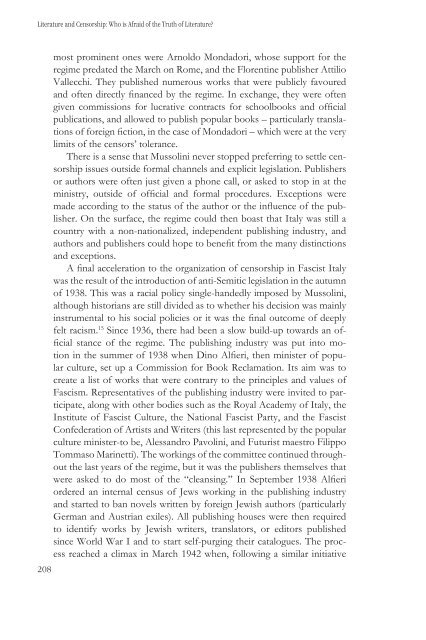Literatura in cenzura - Društvo za primerjalno književnost - ZRC SAZU
Literatura in cenzura - Društvo za primerjalno književnost - ZRC SAZU
Literatura in cenzura - Društvo za primerjalno književnost - ZRC SAZU
- No tags were found...
You also want an ePaper? Increase the reach of your titles
YUMPU automatically turns print PDFs into web optimized ePapers that Google loves.
Literature and Censorship: Who is Afraid of the Truth of Literature?208most prom<strong>in</strong>ent ones were Arnoldo Mondadori, whose support for theregime predated the March on Rome, and the Florent<strong>in</strong>e publisher AttilioVallecchi. They published numerous works that were publicly favouredand often directly f<strong>in</strong>anced by the regime. In exchange, they were oftengiven commissions for lucrative contracts for schoolbooks and officialpublications, and allowed to publish popular books – particularly translationsof foreign fiction, <strong>in</strong> the case of Mondadori – which were at the verylimits of the censors’ tolerance.There is a sense that Mussol<strong>in</strong>i never stopped preferr<strong>in</strong>g to settle censorshipissues outside formal channels and explicit legislation. Publishersor authors were often just given a phone call, or asked to stop <strong>in</strong> at them<strong>in</strong>istry, outside of official and formal procedures. Exceptions weremade accord<strong>in</strong>g to the status of the author or the <strong>in</strong>fluence of the publisher.On the surface, the regime could then boast that Italy was still acountry with a non-nationalized, <strong>in</strong>dependent publish<strong>in</strong>g <strong>in</strong>dustry, andauthors and publishers could hope to benefit from the many dist<strong>in</strong>ctionsand exceptions.A f<strong>in</strong>al acceleration to the organi<strong>za</strong>tion of censorship <strong>in</strong> Fascist Italywas the result of the <strong>in</strong>troduction of anti-Semitic legislation <strong>in</strong> the autumnof 1938. This was a racial policy s<strong>in</strong>gle-handedly imposed by Mussol<strong>in</strong>i,although historians are still divided as to whether his decision was ma<strong>in</strong>ly<strong>in</strong>strumental to his social policies or it was the f<strong>in</strong>al outcome of deeplyfelt racism. 15 S<strong>in</strong>ce 1936, there had been a slow build-up towards an officialstance of the regime. The publish<strong>in</strong>g <strong>in</strong>dustry was put <strong>in</strong>to motion<strong>in</strong> the summer of 1938 when D<strong>in</strong>o Alfieri, then m<strong>in</strong>ister of popularculture, set up a Commission for Book Reclamation. Its aim was tocreate a list of works that were contrary to the pr<strong>in</strong>ciples and values ofFascism. Representatives of the publish<strong>in</strong>g <strong>in</strong>dustry were <strong>in</strong>vited to participate,along with other bodies such as the Royal Academy of Italy, theInstitute of Fascist Culture, the National Fascist Party, and the FascistConfederation of Artists and Writers (this last represented by the popularculture m<strong>in</strong>ister-to be, Alessandro Pavol<strong>in</strong>i, and Futurist maestro FilippoTommaso Mar<strong>in</strong>etti). The work<strong>in</strong>gs of the committee cont<strong>in</strong>ued throughoutthe last years of the regime, but it was the publishers themselves thatwere asked to do most of the “cleans<strong>in</strong>g.” In September 1938 Alfieriordered an <strong>in</strong>ternal census of Jews work<strong>in</strong>g <strong>in</strong> the publish<strong>in</strong>g <strong>in</strong>dustryand started to ban novels written by foreign Jewish authors (particularlyGerman and Austrian exiles). All publish<strong>in</strong>g houses were then requiredto identify works by Jewish writers, translators, or editors publisheds<strong>in</strong>ce World War I and to start self-purg<strong>in</strong>g their catalogues. The processreached a climax <strong>in</strong> March 1942 when, follow<strong>in</strong>g a similar <strong>in</strong>itiative
















